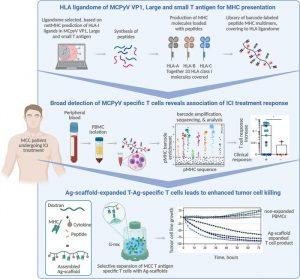A recent study offers a beacon of hope for patients battling Merkel cell carcinoma (MCC), a rare but aggressive form of skin cancer (Figure 1). The study has identified a novel approach to harness the power of the immune system to combat this deadly disease.
The crux of the research lies in pinpointing specific viral components, called epitopes, within the Merkel cell polyomavirus (MCPyV) – the primary culprit behind MCC development. These epitopes serve as flags for the immune system’s T cells, allowing them to recognize and eliminate virus-infected cells. However, in elderly or immunocompromised individuals, this natural defense mechanism often weakens, leaving them susceptible to MCC.
Building upon previous clinical trials, the researchers employed a two-pronged strategy. First, they leveraged a well-established technique known as immune checkpoint blockade, a Nobel Prize-winning approach that reinvigorates exhausted T cells by blocking the PD-1 receptor. This essentially removes the “brakes” on the immune system, allowing T cells to unleash a more potent attack.
Secondly, the researchers developed a unique method to cultivate a large number of MCC-specific T cells directly from patients. This innovative approach utilizes technology involving nanostructures designed to stimulate T cells against MCPyV epitopes. This personalized approach ensures the generated T cells are highly targeted towards eradicating cancer cells.
The study demonstrates the successful expansion of T cells capable of targeting MCC in a significant portion (90%) of patient samples.
The potential impact of this research is significant. If successful, it could lead to the development of a new immunotherapy specifically tailored to combat MCC. This targeted approach offers a potentially more effective and personalized treatment option for patients battling this aggressive form of skin cancer.
Journal article: Hansen, U.K. et al., 2024. T antigen–specific CD8+ T cells associate with PD-1 blockade response in virus-positive Merkel cell carcinoma, Journal of Clinical Investigation.
Summary by Stefan Botha











